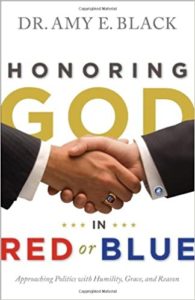
Honoring God in Red and Blue:Approaching Politics with Humility, Grace, and Reason.
Given the space limitations with which we work at Christian Scholar’s Review, unfortunately it proves impossible to commission reviews of all of the books meriting such consideration. As a result, books that often get cut include those designed to serve broad audiences and/or a wide range of educational contexts. In order to try to rectify this challenge, we will occasionally publish a section entitled “For the Classroom.” Books in this occasional series will hopefully prove timely and meet the curricular and co-curricular needs in a variety of contexts. In order to capture what is at stake in such a text, we also decided to commission reviews from both an accomplished rising senior student as well as an accomplished faculty member. The thought behind doing so is that often the best intentions of faculty members and administrators when it comes to the selection of reading for such contexts often misses the mark in terms of what even the most motivated students can and will appreciate. We are thus hopeful that what follows is also the beginning of an effort to help assist in rectifying that possible dilemma.
Katherine E. Loughead is a student in the John Wesley Honors College, Indiana Wesleyan University, and Kevin R. den Dulk is Paul B. Henry Chair in Political Science at Calvin College.
Student Review – Katherine E. Loughead
Even without attending charm school, most Americans are well aware of certain guidelines surrounding proper dinner table etiquette, one of them being to avoid discussions of religion and politics among guests. Most of us also understand the reasoning for such a rule. As a result of our sinful human nature, we readily neglect to love our neighbors as ourselves, especially when dealing with matters connected intimately to our personal pride and emotions. Religious devotees, politically minded individuals, and passive eyewitnesses alike have experienced the atmospheric tension that oftentimes accompanies religious or political disagreements among people. However, in Honoring God in Red or Blue, Amy E. Black, an Associate Professor of Political Science and Department Chair at Wheaton College, offers an optimistic view of our potential to aim toward righteous living without limiting our liberty to discuss and promote the concerns we hold most dear.
Black addresses a broad audience in Honoring God. Her primary readers are curious Christians who want to become more informed and engaged in the United States’ political process, but she also writes to readers who are already knowledgeable and active in American politics. Her book consists of three distinct parts, with each section playing a significant role in addressing the issue of how Christians should honor God through their political beliefs, conversations, and activism.
In her introduction, Black outlines her goals for readers. As a result of reading her book, she hopes we will learn how to reflect God’s Truth better in our political engagements as we continually develop and refine our individual faith-based perspectives. A major strength of Black’s book lies in her consistency in main-taining an unbiased point of view without compromising her personal political ideologies. Black principally wants us to reflect God’s Truth through our political interests and involvement.
In the first section, “In Defense of Politics,” Black explains her three underlying assumptions. First, the United States is a nation of diverse faiths and, as such, Christians “should not expect everyone to accept nor to embrace political argu-ments that appeal exclusively to Christian principles and doctrine” (17). She states, “Just as I want the government to protect my freedom to worship as I choose, so must I promote policies that respect the right of others to practice their religion” (18). She proceeds to say religion and politics are, by nature, interconnected, and people’s religious beliefs will affect their politics either directly or indirectly in some capacity. She also assumes government is important for the preservation of a well-ordered society and the protection of its people, but loving God should take ultimate precedence in the lives of Christians. She encourages readers to remember the words of 1 Corinthians 13, especially verses nine and twelve:
For we know in part and we prophesy in part, but when perfection comes, the imperfect disappears. … Now we see but a poor reflection as in a mirror; then we shall see face to face. Now I know in part; then I shall know fully, even as I am fully known.
Black warns readers to recognize the human limitations by which we are all constrained on Earth and, as a result, to proceed with humility and grace as we engage in politics, but to proceed nonetheless.
The second section of Black’s book, called “Government in Action: How Our System Works,” consists of three informative chapters detailing the American government process. She provides an overview of American government at local, state, and federal levels, explains the core values of the three main political parties, and discusses the history of church-state relations. Much of this section contains a clear and helpful review of the bodies of government, famous pieces of legislation, and well-known Supreme Court cases relevant to American history, as well as interesting examples from recent political events. While this information is beneficial to many readers, it is basic knowledge for some college students and adults who are already politically active. Black concludes the second section of Honoring God with chapter 6, entitled, “Church, State, and the United States,” which provides information relevant to all readers about the overall theme of honoring God in politics. This chapter delineates issues of separation of church and state from individual people’s preferences as to how much or little they choose to allow their personal faith to inform their political ideologies.
In the third section, labeled “Honoring God in Politics,” Black begins by explaining how religious rhetoric is part of the American tradition, and that Americans tend to find comfort when political leaders deliver messages of faith and optimism for our country. She states, “Generic religious talk is a staple of American political life, as common as campaign signs printed in red, white, and blue” (118). Black encourages readers to focus less on these examples of civil religion and more on how Christian doctrines actually shape our political beliefs and actions. She provides an explanation of four general categories of political theology – Catholic, Lutheran, Anabaptist, and Reformed – which helps readers understand some of the most prevalent Christian approaches to American politics. In this section, Black reaches the heart of her thesis. She explains the key to honoring God through political involvement is interacting peaceably and respectfully with one another as we promote our ideologies and learn about the beliefs of others. She establishes the difference between “easy” and “hard” political issues, thereby addressing the fact that Americans may sharply disagree about some issues, but for many other issues, Americans can agree about the end goal but disagree about the best way to accomplish this shared goal.
In one of Black’s strongest arguments, she explains how, because we are finite individuals who are called to serve the Lord in a variety of ways, even Christians can disagree on political issues and still work faithfully to promote God’s Kingdom. We each have special interests by which our passions and vocations are driven, and our enthusiasm for these sectors of society will affect our beliefs on how the government should function. Whether God designed us to be especially concerned about education, health care, tax policy, the environment, or anything else, we each have been given unique experiences that affect our perspectives on how to honor God as we strive to improve our government’s efforts to protect humans.
As Black emphasizes repeatedly, two God-glorifying individuals can hold two opposing perspectives on a political issue while still remaining faithful to God’s Truth. The problems our society faces are not black-and-white issues with simple solutions. Different people hold different ideas about how God’s Word should be applied in different circumstances. For example, most Christians agree we should help the poor and downtrodden members of our society, but there are just as many strategies for helping the poor as there are people who wish to lend a hand. Black offers, “Through constructive dialogue and honest listening, Christians with opposing political views can sharpen one another and help inform each other’s political perspectives” (25). Beginning with Christians, if Americans start practicing the countercultural discipline of respectfully engaging each other as we develop and refine our political ideologies, we can significantly transform the way in which our society functions to promote the well-being of all humans.
Just as Black helps readers understand how Christians can hold opposing viewpoints while honoring God in their political actions, so does she strive to convince readers to see the beauty in compromise. Many Americans are frustrated by the slow pace and tedious nature of the American democratic process, but they fail to realize our steady system of government helps protect us and ensure the effective representation of all citizens. Some Christians who hold strong opinions about various pieces of legislation claim they will not settle for anything less than the exact outcome they seek. Black encourages us to challenge this perspective and consider the benefits of compromise: “The hard and important work of politics is seeking common ground, finding a way for people from a range of perspectives to live peaceably with one another” (34). Compromise can lead to Christians promoting the passage of important and meaningful legislation while also maintaining respect for people whose ideologies differ from our own.
In Honoring God, Black not only provides readers with suggestions for how to apply God’s Word to politics, but also she gives an example of how one complex issue can be addressed according to her theory. She includes a case study exploring the issue of poverty and welfare in the United States. She also explains how we can seek biblical guidance on such issues and demonstrates how God-honoring Christians can differ in their approaches to this and similar problems. Finally, she encourages all Christians to search for common ground and areas in which compromise is possible and then to proceed respectfully in our interactions with other people as we engage in political discussions and strive to affect public policy. She reiterates the idea that humility and respect are countercultural attitudes to maintain in the political realm, but honoring God should always be the end goal of our political actions.
Her justification of such a claim might not prove sufficient for all readers, though, for she states,
If Christians viewed politics as a means for demonstrating love in action as a witness to the world, the way we approach politics could fundamentally change. … Politicians might not be as successful on the campaign trail, but then again, winning office is not the ultimate goal of the Christian life (27).
Black continues her discussion without providing substantial advice for people striving to be God-honoring individuals and successful politicians at the same time. Near the end of her book, she similarly states, “Demonstrating Christian character in politics may not be a winning strategy in today’s political climate, but political success should never be our end goal” (197). As a professor who writes to challenge the minds of Christian college students in the process of solidifying their vocational interests, her blunt portrayal of the challenges of thriving in the secular world while staying faithful to Kingdom Truth is a relevant and welcomed warning, but it begs further discussion on the question, “How can I thrive in my Christian life while also succeeding in an inherently secular career?”
Christian college students reading Black’s book will likely discuss this and similar questions as they thoughtfully respond to her claims and advice. Knowing the issue of honoring God in politics cannot possibly be addressed in a book alone, Black helps readers use her words as stepping stones for further deliberation on such a complex issue. She provides discussion questions at the end of each chapter, which are useful for helping individuals and classes contemplate the reading and begin to engage in the type of respectful political discussions she continuously promotes.
tinuously promotes.In Honoring God in Red or Blue, Black claims if we approach politics in a God-honoring manner, respectful and insightful political and religious discussions may be possible, even at the dinner table during this election year. As long as we humbly remember our individual imperfections and the limitations inherent in an imperfect government, our political involvement can be profitable in a way that promotes our government’s goal to protect the rights and freedoms of the American people. If we as Christians begin to embrace this countercultural view of American politics, we allow ourselves the opportunity to find ways to infiltrate God’s Truth into our government, society, and daily lives.
Faculty Review – Kevin R. den Dulk
The cottage industry for books on political polarization is booming ahead of the presidential election. Consider just a few recent titles. The columnist E. J. Dionne bemoans “our divided political heart” in an “age of discontent.”1 Political scientists Thomas Mann and Norm Ornstein reveal that new forms of “extremism” are creating a constitutional crisis that is “even worse than it looks.”2 Charles Murray, the controversial social scientist, warns that political culture is “coming apart” along socioeconomic fissures.3 The pollster Doug Schoen surveys the po-litical landscape and concludes that Americans are “hopelessly divided.”4 While these prominent voices, among many others, differ in approach and explanation, they share a common message: public life in the United States is in a dismal state of fragmentation.
What to make of this bleak message? Amy Black, in Honoring God in Red or Blue, suggests we ought not give up hope. To be clear, she is no Pollyanna. On the contrary, she is a clear-eyed political scientist at Wheaton College who recognizes that real political disagreements divide both elites and ordinary citizens in the United States. She also acknowledges that profound differences among Christians often shape these political rifts. But Black argues that it is precisely a Christian perspective that reminds us that our “ultimate calling is to love God and follow Him” in all aspects of life, including our engagement as citizens. Such a high calling demands humility, grace, and a generous spirit, even in the face of disagreement. Black aims to show how to meet the expectations of this calling in a political culture that celebrates arrogance, division, and ideological obduracy.
Of course Black’s emphasis on human calling and citizenship applies to all Christians. But Honoring God in Red or Blue targets a narrower audience, namely, students attending Christian colleges. In that context, the book is best suited to an introductory course in American politics. (One could also make a case for advanced placement courses in government at Christian high schools). It could fit uneasily in a general introduction to politics or citizenship, but the lack of serious cross-national perspective would make that classroom application a harder sell.
This is an appropriate focus. Even though younger people are civically engaged in myriad ways, we know they are increasingly alienated from government as a locus of their participation. So Black commences the book in the right place for a college audience: a “defense of politics.” She begins her defense obliquely by focusing not on government itself but on citizens’ posture toward it. Her goal is to convince readers that a satisfying politics is possible only when practiced with a public virtue of humility that flows from our calling to love and follow God. In Black’s frank assessment, one of the key implications of approaching politics humbly is that we will be less likely to sacralize our political preferences and to turn politics into an idol.
An underlying assumption here is that human beings do not have perfect insight into God’s will for our public life. A politics that rests in partial knowledge – as Black puts it, “politics in shades of grey,” rather than black and white (33-38) – raises the possibility of democratic compromise. This straightforward acknowledgement of moral ambiguity as an elemental feature of politics is, from my perspective, Black’s most important claim. In the classroom, I have no doubt that it will chasten some, hearten others, and invite deeper discussion about alternative perspectives, notably political separatism and relativism.5
Black takes a more direct approach to defending politics and government in chapter 3. She briefly discusses the biblical basis of governmental authority, as well as the practical reasons we should count good government as “one of God’s gifts to His creation” (45). She emphasizes government’s role in maintaining the rule of law and providing key public goods. She gives some attention here to the reciprocal relationship between government and citizens, but she does not explic-itly connect the dots between a Christian perspective on government and why (in contrast to how) citizens ought to participate. Readers must wait until chapter 7 for that discussion. The overall message of chapter 3 is “balance”: government has important yet limited roles in public life.
Part 2 of the book is nuts-and-bolts. Chapter 4 examines separation of powers and federalism; chapter 5 explores partisanship and ideology. These are standard topics in an introductory text, and Black clearly describes them and offers good examples (I particularly appreciate her examples from local politics, which often gets short shrift). Black includes numerous text boxes with narrated illustrations of key points, and these are often effective. It is worth noting, however, that the book generally lacks graphics and other creative visualizations of information. That is felt keenly in these two chapters, which would have been strengthened with organizational charts, maps of the spatial dimensions of electoral politics, simple tables with basic statistics, and so on.
Students will come away from these chapters with the basics, which is really all Black could provide in a text that is both a Christian reflection on practical citizenship and an introduction to American politics. She offers a conventional treatment of the separation of powers and she notes the importance of state and local governments. Instructors will likely wish to amplify on her brief example, drawn from abortion politics, of how these institutions share power by being “forced to work together” (70-71), which is of course the genius – or folly, depending on your view – of the constitutional structure of checks and balances. In the chapter on political attitudes and behaviors, she rightly notes the limits to ideological labels, and she attends to both the bad and good functions of parties in the American system.
Chapter 6 focuses exclusively on church, state, and the Constitution, which is a rare topic for a single chapter in an introductory text. But Black uses the chapter to make a simple yet powerful distinction: the separation of religious and state institutions is different than the separation of religion and public engagement. While one might quibble with Black’s typological analysis, her clarity on the difference between church-state interaction and an individual’s faithful engagement is a helpful corrective to the muddied public rhetoric about religion’s role in public life.
Part 3 circles the book back to its central theme: how do we honor God in our politics? Black sets up chapter 7 by reminding Christians to be cautious about their own complicity in a particular kind of “faith”: civil religion. She urges readers to respond to civil religion by using the tools of traditional theological thinking. To that end, she briefly introduces readers to Catholic, Reformed, Lutheran, and Anabaptist perspectives. Black’s treatment of these key models is evenhanded and, to my knowledge, accurate; her goal is not to endorse a particular view, but to help readers clarify for themselves how their faith commitments cut across politics.
The next two chapters focus on the knotty question of how to disagree on political matters. Black uses the distinction between “hard” and “easy” issues as a useful hook to explain that healthy political dialogue will come in different forms, often depending on whether citizens agree on ends and/or means. Black also notes that dialogue may take on a unique cast when we talk to fellow Christians. Consequently, she devotes chapter 9 to specific guidance for Christians who disagree among themselves.
The next chapter, which focuses on voting, read like an outlier in this part of the book. Unlike the previous chapters, it is not rooted in any explicit insights about what it means to honor God by participating in elections. To be sure, Black provides solid advice and resources to voters, including some strong cautions about succumbing to campaign messages. But her suggestions do not link to the underlying message of the book. I would suggest that Black’s best opportunity to do so would have been the section entitled “The Expectations Game,” in which she lays out the “trustee” and “delegate” models of representation. Black describes these models as if they have little moral freight; readers are simply told to identify their “preferred” model, and then to evaluate candidates accordingly (171). But it strikes me that Christians might have something to say about whether one of the models – or some other alternative – provides a better way of understanding representation.
Black comes back to the book’s theme in the final chapter, which surveys a few non-electoral forms of participation and concludes with helpful bullet points about Christian engagement. The first of these points is that, in a pluralistic, morally ambiguous environment, “politics is complex.” That is perhaps the greatest challenge of the book. After all, complexity can be – and often is – politically paralyzing.6 We participate less when we lack certainty about how our moral commitments apply in the hurly-burly of electoral campaigns and policy-making. The value of Honoring God in Red or Blue is that it provides a starting point for addressing the tension between robust democratic participation on the one hand, and the humble acceptance of moral ambiguity in politics on the other.
Cite this article
Footnotes
E. J. Dionne, Our Divided Political Heart: The Battle for the American Idea in an Age of Discontent (New York: Bloomsbury USA, 2012).- Thomas E. Mann and Norman J. Ornstein, It’s Even Worse Than It Looks: How the American Constitutional System Collided with the New Politics of Extremism (New York: Basic Books, 2012).
- Charles Murray, Coming Apart: The State of White America, 1960-2010 (New York: Crown Publishing, 2012).
Douglas E. Schoen, Hopelessly Divided: The New Crisis in American Politics and What It Means for 2012 and Beyond (Lanham, MD: Roman and Littlefield, 2012). My emphasis.- Black quotes approvingly the late Congressman Paul B. Henry, who spoke more clearly than anyone I know about the politics of moral ambiguity. See Paul B. Henry, “Coming Out of the Wilderness” and “Morality versus Moralism: In Defense of Politics,” in Douglas L. Koopman, ed., Serving the Claims of Justice: The Thoughts of Paul B. Henry (Grand Rapids, MI: Henry Institute, 2011), 59-78, 257-265.
- A key empirical perspective on this point is Diana Mutz, Hearing the Other Side: Deliberative Versus Participatory Democracy (New York: Cambridge University Press, 2006).





















